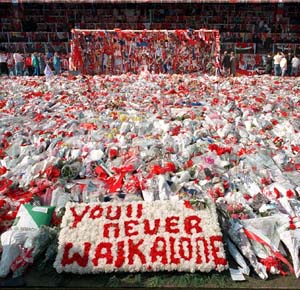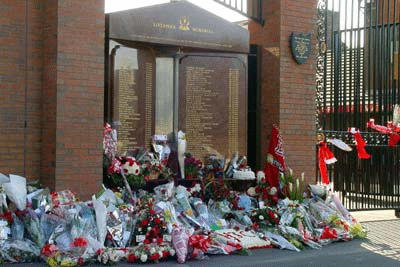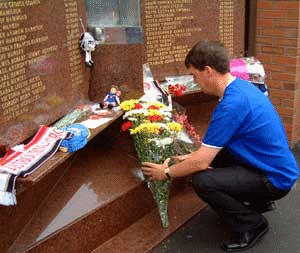Part 1: What Hillsborough means to me
To commemorate the 20th anniversary of the Hillsborough disaster we speak to Kenny Dalglish, Rafa Benitez, Gordon Brown, Gary Ablett, David Moyes and Brian Reade to find out what April 15, 1989, means to them.

KENNY DALGLISH, Liverpool manager in 1989
Hillsborough taught me the value of life, really. Football is very, very important but for two or three weeks after Hillsborough it became unimportant. The most important part of that time were the people's lives. Those who lost someone were the ones who made the decision of whether we went back to play or not.
For me, the greatest thing we did was to win the FA Cup that year. There were so many Evertonians who came to Anfield to pay their respects who had never been in the ground before. The rivalry went out of the window for that, just as it did with Manchester United who had many supporters coming over. It pulled a lot of fans closer together and made people realise it could have been their team. Hillsborough put things into perspective and certainly put football on the back-burner in the aftermath.
After it was decided we would go ahead and play again we had to do our best. When we went to Celtic Park for the first game afterwards it was an unbelievable occasion and the first competitive game back at Goodison was equally fitting as well. To finish the season with the FA Cup meant a huge amount to a great deal of people.
The people were absolutely magnificent in enduring Hillsborough and then in the aftermath the people of Merseyside and football people in general were fantastic in the support they gave everyone and in the way they turned up to the ground to pay their respects. Even now, the eternal flame burns outside the ground and has never been vandalised in any way, shape or form. I think that's a tremendous mark of respect from football fans who come to Anfield, because it is at the away end. It shows people want to pay their respects to those who lost their lives. The more time people spend talking about the good things the better.

RAFAEL BENITEZ, Liverpool manager
On the day of the disaster I was still living in Spain and have to admit that at first we didn't realise the magnitude of what had happened. It was only afterwards, when I heard the stories on the news that I realised the full extent of it.
When I came to the club in 2004 my understanding grew and after hearing more stories from the fans and the staff, it made me realise just how important it is for the people here. I think that the whole of football should be aware of the events of Hillsborough. It was a terrible tragedy and we must always remember those who lost their lives there.
The first time I attended the annual service at Anfield was very emotional. It was amazing to see the support of the people and the respect that they were showing. It is the same every year. As a father and a family man, you think about this when you are reading the names of those who lost their lives. You look at the families and you can see what it means for everyone involved. When you think about your own daughters and imagine what it would be like for yourself, it is then that you realise the scale of such a disaster.
I'm really impressed with the families and their efforts to ensure their memory is never forgotten. The staff and everyone involved at the club will always be there trying to help them in any way we can. They should know that the club will always be behind them and we will try to support them as much as possible.

GORDON BROWN, Prime Minister
People will never forget that day; it's etched on our memories. I remember just hearing half hour by half hour the news as it came across from the Hillsborough stadium. It was then that I started to realise what a major disaster that this was. I also remember how the Liverpool fans helped each other, coming to the aid of people who were in difficulty and trying to rescue fellow fans - both young and old. I don't think we can ever forget the 96 people who died.
I think that the families, in trying to cope with this disaster, have had the support of all decent minded people across the country. I think that's probably what matters most: that people understood that the behaviour of Liverpool fans in helping each other was, as I think the judge said, 'Magnificent'; that it was wrong for people to blame, as some did, Liverpool fans on that day and it's right that the Freedom of the City has been given to the families of Liverpool fans on the occasion of the 20th anniversary of this disaster.
I think people have learned first of all not to rush to instant judgements and some of the people who did rush to instant judgements have been proven wrong and that's why the Liverpool people are so respected throughout the country. The work that they did to help each other on that day and subsequent events when people had to help each other through the difficult times is something that will never be forgotten.
I feel that the best thing that we can do is say that the memories of these fans who died will always be in our minds, that the country understands the difficulties that people have gone through and that there is huge public support and affection for the families that have had to suffer so much. Let's never forget the fans who cruelly lost their lives on a day when we know the people of Liverpool were trying, if they were in that ground, to help each other and that's the spirit of Liverpool.

GARY ABLETT, Reserve team coach and first-team player in 1989
It was the second FA Cup semi-final in two years against Forest and we were going into it confident and expecting to win the game. The events that unfolded meant that no-one really cares what happened in the game, and that's how it should be. It's something I've had to cope with for the past 20 years.
I first noticed something wrong in the warm-up when I looked behind the goal and saw how many people were in there. When we came out just before kick-off you could see people up against the railings at the front. It's difficult to think something isn't right at the time because you are trying to concentrate on the next 90 minutes. The most noticeable thing was at about six minutes past three when the referee stopped the game. I was pretty close to the by-line and in the area of that terracing and to see the amount of people in there, I just thought to myself, 'It doesn't half look busy in there.' The referee called us off the pitch and we were expecting to go back on almost straight away. We kept warm in the changing room but as time went on we realised something was horrifically wrong.
That's probably the worst journey home any of us have had the misfortune to be on. It was a very sombre drive back to Liverpool. No-one spoke much. It was only then it started to hit home what had happened. Kenny Dalglish and his wife Marina led from the front in terms of putting themselves out there and being available for anyone to talk to. I remember going back to Sheffield and seeing some of the things there was very tough. I was only 23 at the time... It's not something you'll forget. We came back to Anfield and didn't play for many, many weeks. I think we got just as much from talking to the families as they did from us in terms of trying to understand what had happened. Listening to people's accounts of loved ones and why they supported the club - it was a difficult couple of weeks. The more time that passed, the more the families said we had to play again because that's what their loved one would have wanted. We started to get the feeling we had to get back into the swing of things.
The final isn't remembered so much for the game, but more for what the occasion stood for. Everton were in a no-win situation but they helped play their part in a memorable game as a fitting tribute for those who lost their lives.
The service held at Anfield every year offers a chance for everyone to come together and remember as one the events of that day. I was very honoured to be asked to read last year, which I did. I'll be there again this year and it's good for us to remember what happened on that fateful day.
I would love for the families to get closure. I would love for them to get the answers so they know what actually happened that day. Whether it ever does or not, I don't know. But if I could have one wish it would be for those families to get answers and for those responsible to be held accountable for that.

DAVID MOYES, Everton Football Club manager
It was a tragic day and something I will always remember. I think I was playing at Shrewsbury when news filtered through on the day of the disaster. I just felt shock and horror at what had happened.
When I was a supporter myself I remember going down to the front and experiencing the feeling of being crushed. I didn't enjoy that, but I always felt people around me would help and support me. Coming from Glasgow I was brought up with the Ibrox disaster and the Hillsborough disaster is another one which should never have happened.
Kenny Dalglish is a great man and he did everything in the right manner in the aftermath. What can you say to families that have lost loved ones? They see them go to a football match but at the end of the day they don't come home. For all the rivalry we have between clubs, nothing is more important than life. On that day they were just supporting their team and it is such a tragic loss.
Everyone at Everton Football Club is behind the families and we will certainly observe any silence for anyone connected with Liverpool.

BRIAN READE, Daily Mirror columnist
The fans in the central pens looked like sardines packed in together. You could see on either side that there was more space and it seemed weird so many were in that same area. The noise was strange too. There was like a muffled murmur in the air - very different from a normal match day.
Suddenly, the game stops and people start pouring onto the pitch. Then you see fans going underneath you with ripped advertising hoardings as stretchers and fans putting coats over faces. Once I saw that I started to think the worst.
As we left the ground after it was announced the game had been abandoned, we knew there had been deaths. Most people wanted to find a phone box to tell people back home they were okay. You just couldn't find a phone that day, not even in the pub. The queues were massive. We drove home and I remember seeing a lot of cars going the other way and thinking,'There are probably parents in some of those cars going to identify the bodies of their kids.' We were listening to the radio and the death toll was increasing. I got home and watched it on the news. I really exploded into a rage.
I went to bed that night and I had the worst sleep of my life. I had this horrible nightmare and drenched the bed with sweat. I had to go to the spare room and I drenched that too. The toll of the day was just coming out of me. I needed to get it out of me, so I wrote a piece. I worked at the Daily Post at the time and titled it 'Dead because they didn't count'. It was about how society had mistreated football fans to such an extent that this is what happens. People die behind cages because they are football fans and they don't count.
Twenty years on fans today wouldn't believe that. They sit in all-seater grounds that are stewarded correctly and it's all because of Hillsborough. Back then supporters were treated as animals. We were all treated as potential criminals. I heard the president of UEFA at the time saying that Liverpool fans were like beasts entering the arena and that was the last straw for me. All the slurs were coming at us and it was bad enough without that. I was 31 at the time and of those 96 who died, 48 of them were 21 or younger. It was the young, innocent ones who died. They'd gotten in there early to get a good view. As a result of that there was a sense of guilt among those who had gone home alive that day.
All the slurs were coming at us and it was bad enough without that. I was 31 at the time and of those 96 who died, 48 of them were 21 or younger. It was the young, innocent ones who died. They'd gotten in there early to get a good view. As a result of that there was a sense of guilt among those who had gone home alive that day.
When I finally went back to work I wrote a piece called 'Guilty for being alive'. When there is no justice and no-one is held accountable, it angers you even more. God knows what the families feel. It's unfinished business and when you think about it, it angers you again.
It's the most cost-effective disaster in the history of Britain. Ninety six people died but not one person lost a day's pay or a day's liberty. Fourteen police officers sued South Yorkshire police because they were traumatised. They won the case. They got over one million pound in compensation. They won it because the court accepted that the reason they had been traumatised was due to the neglect of their superiors. That is exactly what Lord Taylor said in his report. That still enrages me now.
There are things that have not been resolved and this is what angers everybody. As a city Liverpool was united in horror and disgust. The story that the fans urinated on the police and pick-pocketed the dead was such a fantasy tale. Twenty years on, not one person has come forward to back up that story. Nor has there been one image, of the hundreds there are, that shows anything like that happening. And yet, the man who printed this, still - to this day - believes it to be the truth.
I actually interviewed Lord Taylor and he told me that he'd had a chief constable sit with him who agreed with everything he put in the report. He said it was the most black and white case because it was so clear what happened. It was a breakdown in police control. The families thought they would get justice but it was a complete cover up. The inquests weren't adequate and it wasn't accidental. The families just want someone to take responsibility and say sorry. That's the big tragedy for me, that even the families' motives have not been fully understood. It's shameful that we should have to defend what happened that day. The bereaved are people who have been cruelly treated by the system.
My initial instinct is to say there will never be justice; but you must maintain hope. With it being the 20th anniversary people will point these facts out again. There is a new generation of people who have come along who don't know what happened that day. These new fans won't be able to understand how supporters were treated back then. Who knows, a politician or someone like that may put pressure on the government to have another enquiry.
The one overriding feeling I am left with is sadness. It still comes to me if it's a sunny day or I see a number 96 bus... I cry and the sadness gets to me. If I've still got it, what must it be like for the families? I'm proud with how they have handled themselves. They have shown a stoic response to this. They have been strong, brave and principled.
To read part 2 of this feature, click here>>



